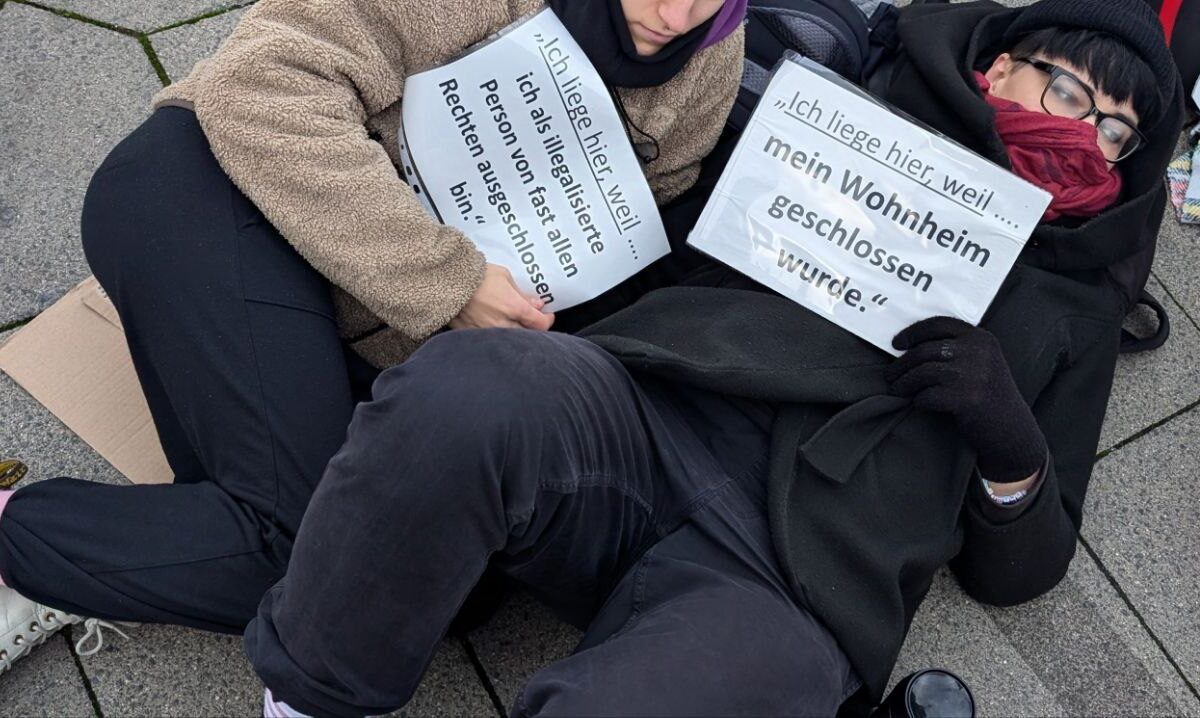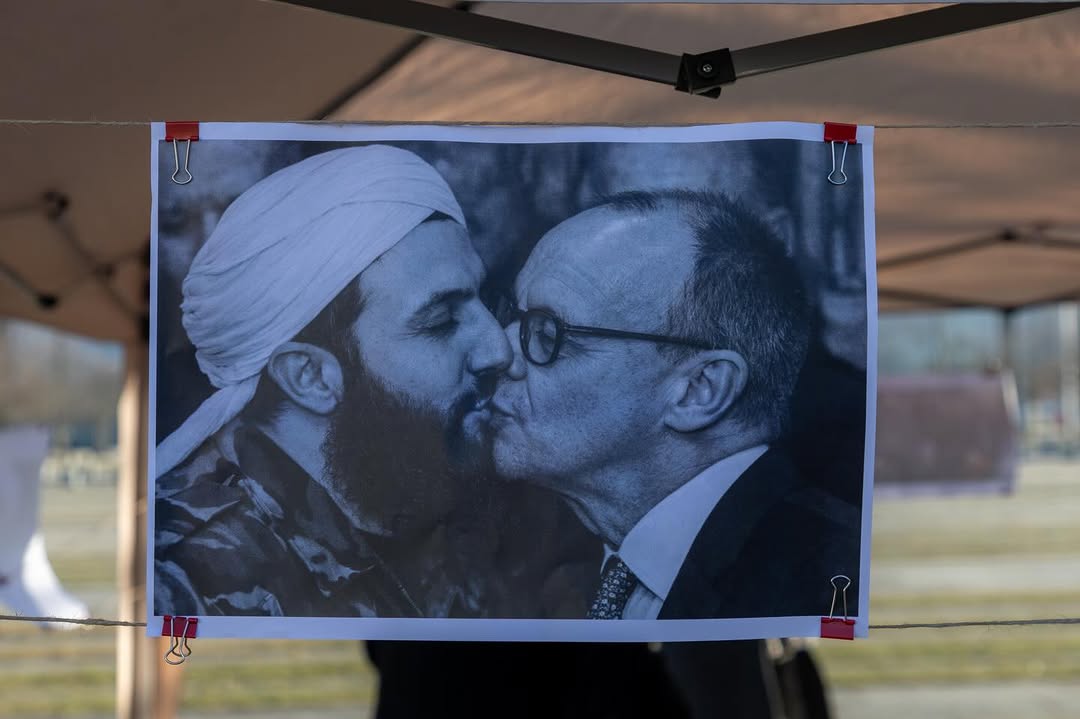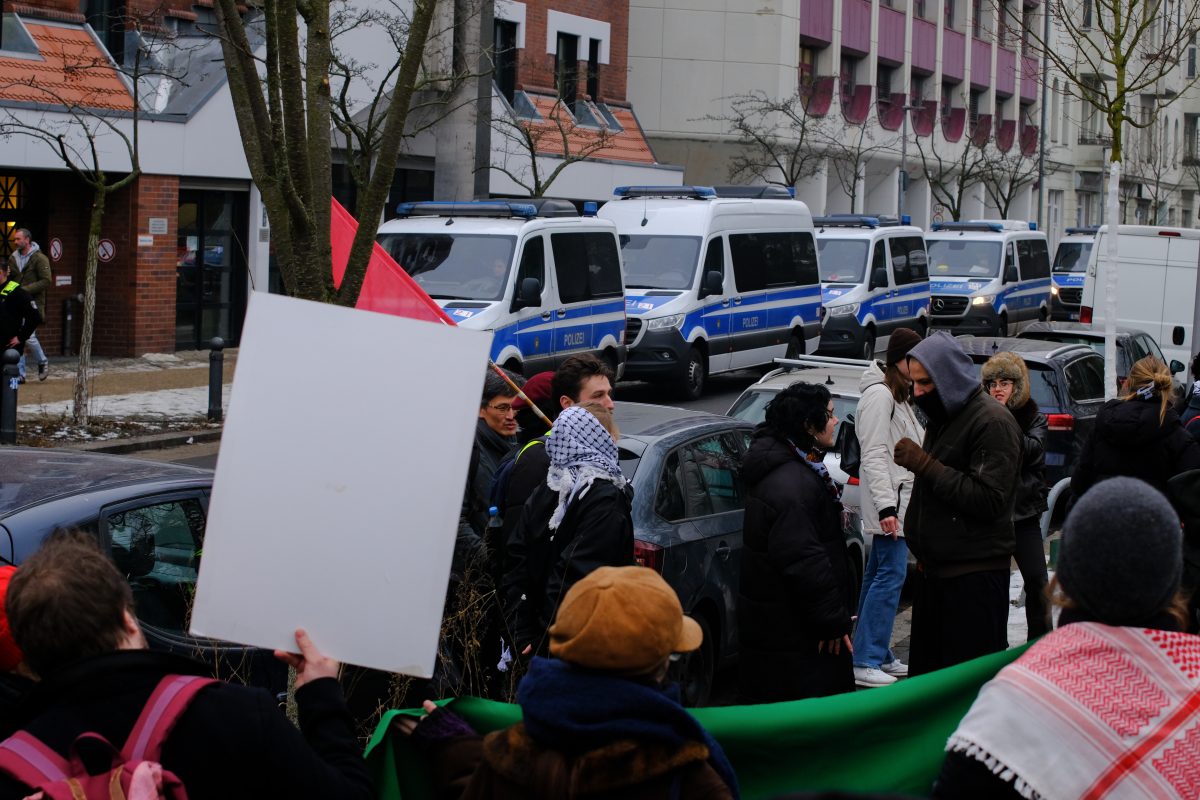My name is Michele, I work as a social worker in the housing emergency aid and am privately politically active within the areas of anti-racism, anti-fascism and anti-capitalism. Today we stand, lie and sit here in front of the Rotes Rathaus to protest against the announced cuts for the housing emergency aid, that the senate has now announced and confirmed.
As complex as the social challenges of the last years may seem, there is an undeniable interaction of political decisions, that further deepen social inequality.
While our government wants to economise funds for the aid of exactly those people who are already suffering from discrimination, marginalisation and social exclusion, the rich continue to get richer, the poor even poorer, and us social workers can only watch from the outside how these funds that seem to be much more needed elsewhere are put into armaments, the militarisation of public space and a politics of continuous displacement.
As social workers we inhabit an unavoidable ethically challenging dual role within our work. While we aid our clients as best as possible, orientating on resources and strengthening their ability to aid themselves, we often find ourselves as involuntary “henchmen” of a capitalistic system, when we follow avoidable nonsensical instructions and bow to regulations, just to avoid the restriction of desperately needed resources. It is blatant and yet still shocking how dependent we are on the state within our aid projects or narrowly district-funded institutions, how quickly people in need of aid become sums and numbers.
And if we are already talking about numbers, we should be aware that our Federal Government has granted 4163 export licenses for weapons and military equipment worth 10,9 billion Euros between the 1st of January and the 15th of October this year, while we are here in sleet at 3 degrees Celsius, standing and lying and having to beg that our projects aren’t being given up that are meant to help people here who need that help because of war and military support. This is often all to no avail.
We are begging for 150 euros more that have been promised to us a year ago (Cue: Capital Allowance), we are begging for four layered toilet paper, and the preservation of important social and sociocultural institutions, and that we and especially the people that are already freezing will be spared from the icy social cold of the senate. And yes, we would damn well also like some recognition! Beause at the end of the day, it’s not Mr. Evers, who is smoothing out social injustices, and also not Mrs. Kiziltepe, who has to rescue people. “Berlin stays a social capital”, because we are social. Because we don’t let ourselves be divided, and we continue to recapture the people who are systematically pushed out of the city centre before they fall behind.
Hostile architecture, like benches with massive gaps and music and bright lights at train stations, are just some examples of how homeless people are pushed out of the public space. Just recently I read, that the BVG are currently busy widening repression against homeless and “maladjusted” people – against people who, considering the upcoming cold spell, will be increasingly situated within train stations and public transport. There will be an increased amount of security staff at these places, to surveil them and to oust homeless people. But where are the homeless meant to go, dear BVG, where?
Even if they were able to get a place, many homeless people avoid forced communal mass emergency shelters. These usually have to be left during the day anyway. Two thirds of all homeless people report experiences of violence in these emergency shelters, as well as theft, conflicts, racism and aggression towards each other. Many also report that the counselling is inadequate, if there is any at all. There is a massive lack of day centres for the stay until the next evening. There is – who would have guessed it – just “no funding”.
The question we should be asking ourselves is: Why are so many resources put into the military complex – through the financing of weapon exports to countries at war, in the armament of police and military and the expansion of surveillance structures within the city center, while the social infrastructure within our country is ruined through savings measures? Why are billions flowing into warfare, but not into the construction of social housing or into the expansion of aid for homelessness that would help the ones who are truly in need?
The paradoxical effects are clear: weapons that are delivered to other countries are furthering the displacement of people, who then have to flee here. Instead of supporting these people, they are further marginalised in our country through a combination of military armament, criminalisation and social neglect.
Because an important point which should not be overlooked within this whole thematic, is that these developments harm especially refugees, migrants, people of colour and other marginalised groups who don’t fit the dominant societal image. They harm those who are confronted with discrimination and disadvantage every day – not just in the job market or within education, but also in access to the basic social services.
The influence of structural racism is enormous on the topic of homelessness. Migrants and People of Colour are not only more often affected by homelessness, because they have a harder time finding housing, they also have a harder time getting access to aid at all. They are confronted with the double burden of poverty and exclusion and are often stigmatised in housing aid. If we don’t address these unjust structures, the situation for many people will get worse and worse.
The developments of recent years also show that the currently rampant racism against migrants, asylum seekers and Muslims also serve as a distraction from the budget crisis and the escalating capitalist competition. The shift to the right within our country is clearly felt: Parties like the AfD and the CDU are using the crisis to further exacerbate their inhumane anti-migrant politics. While implementing the new European asylum rules, the Interior Ministry is using optional EU rules to make German asylum law particularly restrictive. This poses the threat of restrictions on freedom and the detention of people seeking protection, including children, as well as more “safe countries of origin” and “safe third countries”.
The reform of the Common European Asylum System (CEAS) was passed in June 2024 and has to be adapted in the individual member states until summer 2026. This means further change for the worse for people in search of protection. This prognosis is sadly also confirmed in regards to the planned implementation in Germany.
For us as social workers and other people in the social sector it should be even more clear, that we will not continue playing this game and we will not let ourselves be divided. Neither refugees nor recipients of Bürgergeld carry the responsibility for empty funds. It is not the homeless or asylum seekers who decide about investments, salaries and contracts in the public service, but the state! It is not asylum seekers or the homeless who are overworking hospitals, medical practices and the healthcare system, but the government’s dismantling of the healthcare system at the expense of citizens. Nor do homeless people or migrants determine how high rents are – that alone is determined by a profit-oriented market dominated by capitalists who are not the least bit interested in the “margins of society”.
Here is a recent example that just occurred. In Neukölln, a provider of emergency housing aid wanted to open an emergency shelter for 100 people during the cold weather season. And even though the Senat and the district had already given the go-ahead and the beds were already being delivered, the project ultimately failed because the owner of one of the neighbouring properties feared a “loss of value” of his own property. Because across the street people who had no roof over their heads were to be cared for at night. Capitalism: 1. Solidarity: 0.
Homelessness is more than just the lack of a roof above one’s head – it is a social crisis that pushes people to the margins and massively restricts their chances at a dignified life! Housing emergency aid tries to alleviate these emergencies by providing shelter and assistance. However, the financial erosion of these services exacerbates the situation by restricting access to existential support. It provides emergency accommodation, housing support and advice for the most marginalised people in our society. However these support services have been cut back more and more in recent years, dramatically intensifying the already difficult situation for homeless people.
It is time for us to stand up for a fairer society – a society that is not based on control and exclusion, but on help and support for the people who are most in need. We must fight against this development and stand up for policies that fight social inequality instead of furthering it. It is time to take a stand against the mad cuts in housing emergency aid and all other social areas, against structural discrimination against those in need, against the emerging shift to the right by parties that displacement and deportation plans in their election platforms; against armament and financial support for war and against the militarisation of public space, which relies on more control, instead of real solutions.
Translation: Katharina von Stackelberg. Reproduced with permission




